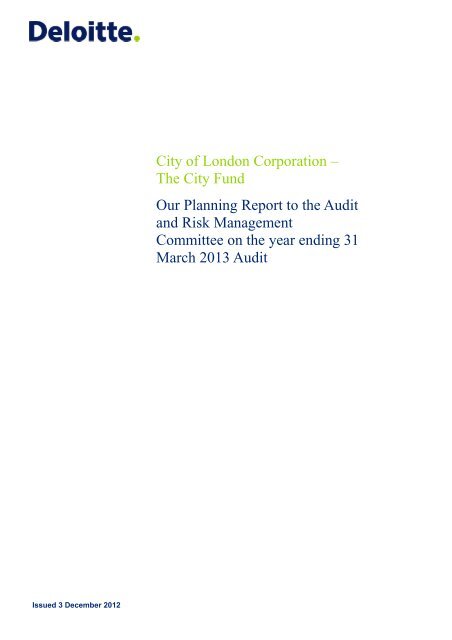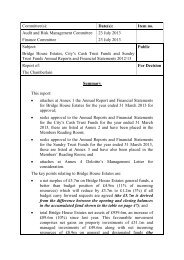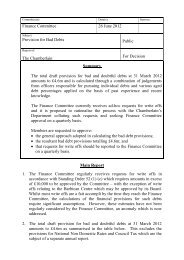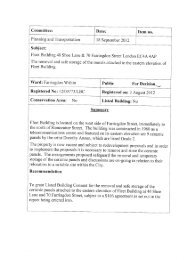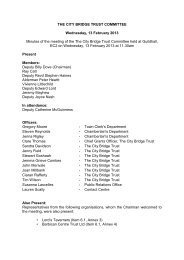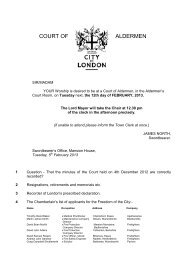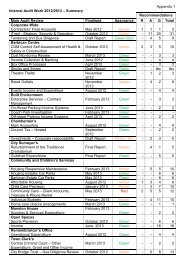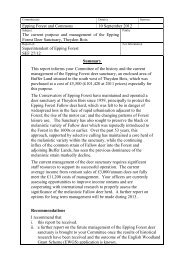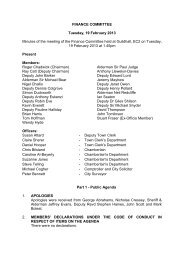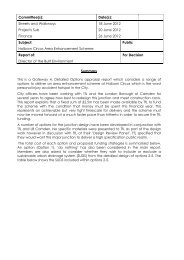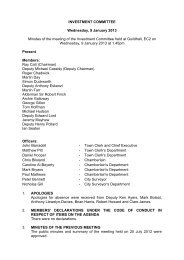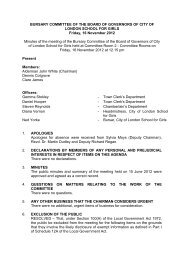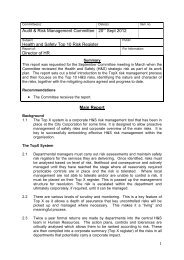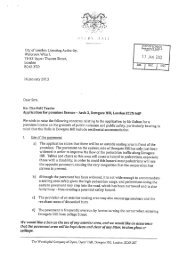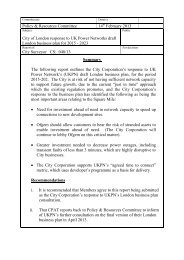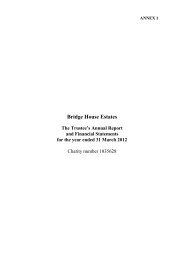Deloitte's Annual Audit Plan for City Fund Financial Statements
Deloitte's Annual Audit Plan for City Fund Financial Statements
Deloitte's Annual Audit Plan for City Fund Financial Statements
You also want an ePaper? Increase the reach of your titles
YUMPU automatically turns print PDFs into web optimized ePapers that Google loves.
Issued 3 December 2012<br />
<strong>City</strong> of London Corporation –<br />
The <strong>City</strong> <strong>Fund</strong><br />
Our <strong>Plan</strong>ning Report to the <strong>Audit</strong><br />
and Risk Management<br />
Committee on the year ending 31<br />
March 2013 <strong>Audit</strong>
The Chairman of the <strong>Audit</strong> and Risk Management Committee<br />
<strong>City</strong> of London<br />
PO Box 270<br />
Guildhall<br />
London EC2P 2EJ<br />
3 December 2012<br />
Dear Sirs<br />
Deloitte LLP is a limited liability partnership registered in England and Wales with registered number OC303675 and<br />
its registered office at 2 New Street Square, London EC4A 3BZ, United Kingdom.<br />
Deloitte LLP is the United Kingdom member firm of Deloitte Touche Tohmatsu Limited (“DTTL”), a UK private<br />
company limited by guarantee,, whose member firms are legally separate and independent entities. Please see<br />
www.deloitte.co.uk/about <strong>for</strong> a detailed description of the legal structure of DTTL and its member firms.<br />
Member of Deloitte Touche Tohmatsu Limited<br />
Deloitte LLP<br />
3 Victoria Square<br />
Victoria Street<br />
St Albans<br />
Hert<strong>for</strong>dshire<br />
AL1 3TF<br />
We have pleasure in setting out in this document our planning report to the <strong>Audit</strong> and Risk Management Committee<br />
of the <strong>City</strong> of London Corporation <strong>for</strong> the year ending 31 March 2013 in respect of the <strong>City</strong> <strong>Fund</strong>, <strong>for</strong> discussion at<br />
the meeting scheduled <strong>for</strong> 12 December 2012. This report covers the principal matters that we will focus on during<br />
our audit <strong>for</strong> the year ending 31 March 2013.<br />
In summary:<br />
The major issues and how we plan to address them are summarised in the Executive Summary.<br />
The scope of our work is in line with the approach taken <strong>for</strong> the audit <strong>for</strong> the year ended 31 March 2012.<br />
There are a number of areas where significant management judgement will be required which we draw your<br />
attention in our report and which you should consider carefully.<br />
The <strong>City</strong> of London is an important client to us and we have built strong working relationships with your<br />
management team. That experience over several years gives us a detailed working knowledge of your structure,<br />
working methods and processes. We have a well-established approach to working with you. However, we are not<br />
complacent and continually seek ways to improve the service we provide to you. As part of this we have asked<br />
one of our senior partners, Sue Barratt, to per<strong>for</strong>m a client service assessment.<br />
We would like to take this opportunity to thank the management team <strong>for</strong> their on-going assistance and will be<br />
completing more detailed planning work in the Spring 2013.<br />
Yours sincerely<br />
Heather Bygrave<br />
Senior Statutory <strong>Audit</strong>or
Contents<br />
Executive summary 1<br />
1. Scope of work and approach 4<br />
2. Significant audit risks 7<br />
3. Other issues 9<br />
4. Responsibility statement 10<br />
Appendix 1: <strong>Audit</strong> fees 11<br />
Appendix 2: Consideration of fraud 12<br />
Appendix 3: <strong>Audit</strong> engagement team 14<br />
Appendix 4: Timetable 15
Executive summary<br />
We have pleasure in setting out in this document details of our proposed audit plan <strong>for</strong> the <strong>City</strong> <strong>Fund</strong> of the <strong>City</strong> of<br />
London Corporation <strong>for</strong> the year ending 31 March 2013. The <strong>Financial</strong> Reporting Council (“FRC”) has made it<br />
clear, in its ‘Update <strong>for</strong> <strong>Audit</strong> and Risk Management Committees – November 2010’ that it expects <strong>Audit</strong><br />
Committees to focus activity on assessing and communicating risks and uncertainties and reliance on estimates,<br />
assumptions and <strong>for</strong>ecasts. Whilst the FRC report is designed <strong>for</strong> private and public companies, the messages are<br />
equally applicable to governance and <strong>Audit</strong> Committees in other organisations. This report will describe the work<br />
we undertake in order to support this activity.<br />
Status Description Detail<br />
Key changes in our audit plan this year<br />
The nature and scope of<br />
our planned procedures<br />
are similar to those set<br />
out in our audit plan <strong>for</strong><br />
the year ended 31 March<br />
2012.<br />
<strong>Audit</strong> scope<br />
Our work is carried out<br />
under the Code of <strong>Audit</strong><br />
Practice 2010, issued by<br />
the <strong>Audit</strong> Commission.<br />
The nature and scope of our planned procedures are similar to<br />
those set out in our audit plan <strong>for</strong> the year ended 31 March 2012.<br />
The principal changes are:<br />
to identify consideration of the accounting treatment of certain<br />
large property transactions as an area of significant audit risk<br />
we no longer assess the reporting of segmental in<strong>for</strong>mation<br />
and the accounting <strong>for</strong> the PP2P contract as significant audit<br />
risks based on our work last year on the <strong>City</strong>’s approach to<br />
these areas and on the assumption there are no changes in<br />
the <strong>City</strong>’s approach or circumstances. We will record and<br />
respond to these as normal risks in our detailed plans.<br />
We conduct our audit in accordance with the Accounts and <strong>Audit</strong><br />
Regulations 2011, the Code of <strong>Audit</strong> Practice 2010 issued by the<br />
<strong>Audit</strong> Commission and our audit of the statement of accounts in<br />
accordance with International Standards on <strong>Audit</strong>ing (UK and<br />
Ireland) as adopted by the UK <strong>Audit</strong>ing Practices Board (“APB”).<br />
The Code requires that we:<br />
issue an opinion on the financial statements of the <strong>City</strong> <strong>Fund</strong>;<br />
satisfy ourselves as to whether the Corporation has put in place<br />
proper arrangements to secure economy, efficiency and<br />
effectiveness in its use of resources in respect of the <strong>City</strong> <strong>Fund</strong>;<br />
consider the completeness of the disclosures in the <strong>Annual</strong><br />
Governance Statement in meeting the relevant requirements<br />
and identify any inconsistencies between the disclosures and<br />
the in<strong>for</strong>mation that we are aware of from our work on the<br />
financial statements and other work; and<br />
issue an assurance report to the National <strong>Audit</strong> Office on the<br />
<strong>City</strong> <strong>Fund</strong> “Whole of Government Accounts” return.<br />
For the 2012/13 financial statements, we have estimated materiality<br />
of £3.9m (2011/12: £3.9m) taking into account spend and reserves<br />
position. We will report to the <strong>Audit</strong> and Risk Management<br />
Committee on all unadjusted misstatements greater than £195,000<br />
(2011/12: £195,000) and other adjustments that are qualitatively<br />
material.<br />
We will update our assessment during the planning and interim visit<br />
based on latest outturn expectations and in<strong>for</strong>m you of any change<br />
in our final report.<br />
Section 1<br />
Section 1<br />
Report to the <strong>Audit</strong> and Risk Management Committee <strong>Plan</strong>ning Report 1
Executive summary (continued)<br />
Status Description Detail<br />
Significant audit risks<br />
We summarise the key<br />
audit risks identified at<br />
this stage.<br />
Other issues<br />
We will in<strong>for</strong>m the <strong>Audit</strong><br />
and Risk Management<br />
Committee of any<br />
changes in our<br />
assessment of the<br />
impact of these issues.<br />
Internal controls<br />
We will evaluate the<br />
design and test the<br />
implementation of key<br />
controls relevant to the<br />
audit.<br />
The significant audit risks which we have identified as part of our<br />
overall audit strategy are:<br />
1. Recognition of grant revenue: Evaluating whether<br />
recognition is consistent with grant terms and conditions<br />
can involve significant judgement. Grant income in the prior<br />
year was £174m.<br />
2. Valuation of property assets: The valuation of the <strong>City</strong>’s<br />
£794m of investment property assets (as at 31 March 2012)<br />
is inherently judgemental.<br />
3. Valuation of the police pension liability. This continues<br />
to be an audit risk in view of the size of the liability and<br />
complexity of judgements in this area. The amount of the<br />
liability at 31 March 2012 was £562m.<br />
4. Bad debt provisions. This is retained as an area of audit<br />
focus in view of the level of judgement involved. Last year<br />
£3.5m was provided against debtors of £57m.<br />
5. Significant property transactions. The <strong>City</strong> <strong>Fund</strong> has<br />
entered into several significant property transactions in the<br />
year, some of which include features which may mean that<br />
the accounting is not straight <strong>for</strong>ward.<br />
6. Management override of controls: our response to this<br />
presumed risk will focus on the testing of journals,<br />
significant accounting estimates (including those above)<br />
and any unusual transactions in the year.<br />
Other issues we will consider in our audit approach, but which we<br />
do not consider to be significant audit risks, include the accounting<br />
<strong>for</strong> the Crossrail funding commitment.<br />
The notes to the accounts in the past four years have disclosed a<br />
commitment made by the <strong>City</strong> to contribute £200 million towards the<br />
cost of Crossrail. We remind the Committee of the discussion of<br />
the accounting treatment in our paper to the July meeting.<br />
To assist us in planning our work, we will evaluate the design and<br />
test the implementation of key controls relevant to the audit,<br />
including controls which mitigate the significant risks of material<br />
misstatement we have identified.<br />
We continue to rely on the work of the <strong>City</strong>’s internal audit function<br />
to in<strong>for</strong>m our risk assessment.<br />
Section 2<br />
Section 3<br />
Section 1<br />
Report to the <strong>Audit</strong> and Risk Management Committee <strong>Plan</strong>ning Report 2
Executive summary (continued)<br />
Status Description Detail<br />
Operational features of our audit plan<br />
Our audit plan is similar<br />
to prior years.<br />
Appendix 2 sets out our approach to considering fraud in relation to<br />
the audit. Appendices 3 and 4 set out our service team and<br />
timetable respectively.<br />
We intend to use our interim visit in March/April 2013 to per<strong>for</strong>m<br />
audit procedures on the <strong>City</strong>’s main transaction streams to reduce<br />
the pressure on management during the year end audit visit in<br />
June/July.<br />
We would be happy to review a skeleton set of financial statements<br />
ahead of the typical reporting timetable if this was of interest to<br />
management.<br />
Prior year uncorrected misstatements including disclosure misstatements<br />
No significant<br />
misstatements were<br />
identified in the course<br />
of the 2012 audit work.<br />
Independence<br />
We confirm our<br />
independence.<br />
We take this opportunity to remind you of the misstatements<br />
identified in the prior period. Uncorrected misstatements in 2012<br />
increased assets and liabilities by £0.3 million.<br />
We would also like to remind you of the following disclosure<br />
misstatement identified in the prior year with a view to addressing<br />
these at an early stage of the current year reporting process: this is<br />
non-compliance with the Code requirement to disclose the date of<br />
the last valuation of assets.<br />
We confirm we are independent of the <strong>City</strong> and will reconfirm our<br />
independence and objectivity to the <strong>Audit</strong> and Risk Management<br />
Committee <strong>for</strong> the year ending 31 March 2013 in our final report to<br />
the <strong>Audit</strong> and Risk Management Committee.<br />
Our responsibilities and those of the Corporation are explained in<br />
the <strong>Audit</strong> Commission’s publication, “The responsibilities of <strong>Audit</strong>ors<br />
and of <strong>Audit</strong>ed Bodies – Local Government” issued March 2010.<br />
Appendices 2,<br />
3 and 4<br />
Appendix 5<br />
Report to the <strong>Audit</strong> and Risk Management Committee <strong>Plan</strong>ning Report 3
1. Scope of work and approach<br />
Key areas of responsibility:<br />
We have four key areas of responsibility under the <strong>Audit</strong> Commission’s Code of <strong>Audit</strong><br />
Practice:<br />
<strong>Financial</strong> statements We will conduct our audit in accordance with International Standards on <strong>Audit</strong>ing (UK<br />
and Ireland) (“ISA (UK and Ireland)”) as adopted by the UK <strong>Audit</strong>ing Practices Board<br />
(“APB”) and the <strong>Audit</strong> Commision’s Code of <strong>Audit</strong> Practice. The <strong>City</strong> will prepare its<br />
accounts under the Code of Local Authority Accounting. There are no significant<br />
changes in respect of the scope of our work in relation to this area of responsibility.<br />
<strong>Annual</strong> Governance<br />
Statement<br />
Value <strong>for</strong> Money<br />
conclusion<br />
Assurance report on the<br />
Whole of Government<br />
Accounts return<br />
We are required to consider the completeness of the disclosures in the <strong>Annual</strong><br />
Governance Statement in meeting the relevant requirements and identify any<br />
inconsistencies between the disclosures and the in<strong>for</strong>mation that we are aware of<br />
from our work on the financial statements and other work. We will also review<br />
reports from relevant regulatory bodies and any related action plans developed by<br />
the <strong>City</strong>.<br />
We are required to satisfy ourselves that the <strong>City</strong> has made proper arrangements <strong>for</strong><br />
securing economy, efficiency and effectiveness in its use of resources and issue a<br />
conclusion on value <strong>for</strong> money. Our conclusion is given in respect of two criteria:<br />
Whether the organisation has proper arrangements in place <strong>for</strong> securing<br />
financial resilience; and<br />
Whether the organisation has proper arrangements <strong>for</strong> challenging how it<br />
secures economy, efficiency and effectiveness.<br />
In discharging this responsibility, we take into account our work on the <strong>Annual</strong><br />
Governance Statement and the work of regulators.<br />
Whole of Government Accounts (WGA) are commercial-style accounts covering all<br />
the public sector and include some 1,700 separate bodies. <strong>Audit</strong>ors appointed by<br />
the <strong>Audit</strong> Commission have a statutory duty under the Code of <strong>Audit</strong> Practice to<br />
review and report on the <strong>City</strong>’s whole of government accounts return. Our report is<br />
issued to the National <strong>Audit</strong> Office (“NAO”) <strong>for</strong> the purposes of their audit of the<br />
Whole of Government Accounts.<br />
Report to the <strong>Audit</strong> and Risk Management Committee <strong>Plan</strong>ning Report 4
1. Scope of work and approach<br />
(continued)<br />
Scoping of material account balances, classes of transactions and disclosures<br />
We will report to you any<br />
significant findings from our<br />
scoping work.<br />
Working with internal audit<br />
We will liaise with internal<br />
audit in planning our work<br />
and utilise their findings in<br />
our risk assessment.<br />
We per<strong>for</strong>m an assessment of risk which includes considering the size,<br />
composition and qualitative factors relating to account balances, classes of<br />
transactions and disclosures. This enables us to determine the scope of further<br />
audit procedures to address the risk of material misstatement. We will report to<br />
you any significant findings from our scoping work.<br />
We will meet with Paul Nagle and his internal audit team to plan our combined<br />
approach in the year.<br />
Following an update of their assessment of the organisational status, scope of<br />
function, objectivity, technical competence and due professional care of the<br />
internal audit team, we will review the findings of internal audit and adjust our<br />
audit approach as is deemed appropriate. This normally takes a number of<br />
<strong>for</strong>ms:<br />
discussion of the work plan <strong>for</strong> internal audit; and<br />
where internal audit identifies specific material deficiencies in the control<br />
environment, we consider adjusting our testing so that the audit risk is<br />
covered by our work.<br />
We will continue to review all internal audit reports issued during the year and<br />
utilise them to assist our risk assessment.<br />
Report to the <strong>Audit</strong> and Risk Management Committee <strong>Plan</strong>ning Report 5
1. Scope of work and approach<br />
(continued)<br />
What audit work do we do on controls?<br />
We will evaluate the design<br />
and implementation of<br />
controls relevant to the<br />
audit.<br />
Obtain and refresh our<br />
understanding of the<br />
entity and its<br />
environment including<br />
the identification of<br />
relevant controls<br />
As set out in "Briefing on audit matters" circulated to you in July 2011, our risk<br />
assessment procedures will include obtaining an understanding of controls<br />
considered to be ‘relevant to the audit’. This involves evaluating the design of<br />
the controls and determining whether they have been implemented (“D& I”). Our<br />
audit approach consists of the following:<br />
Identify risks and any<br />
controls that address<br />
those risks<br />
Carry out 'design and<br />
implementation' work<br />
on relevant controls<br />
If considered<br />
necessary, test the<br />
operating<br />
effectiveness of<br />
selected controls<br />
Design and per<strong>for</strong>m a<br />
combination of<br />
substantive analytical<br />
procedures and tests<br />
of details that are<br />
most responsive to the<br />
assessed risks<br />
The results of our work in obtaining an understanding of controls will be collated<br />
and the impact on the extent of substantive audit testing required will be<br />
considered. We do not anticipate carrying out tests of operating effectiveness of<br />
controls as a fully substantive audit approach will be more efficient <strong>for</strong> the <strong>City</strong><br />
<strong>Fund</strong>.<br />
The results of our work in obtaining an understanding of controls and any<br />
subsequent testing of the operational effectiveness of controls, if applicable, will<br />
be collated and the impact on the extent of substantive audit testing required will<br />
be considered.<br />
Our audit is not designed to provide assurance as to the overall effectiveness of<br />
the controls operating within Corporation, although we will report to management<br />
any recommendations on controls that we may have identified during the course<br />
of our audit work.<br />
Report to the <strong>Audit</strong> and Risk Management Committee <strong>Plan</strong>ning Report 6
2. Significant audit risks<br />
Based upon our initial assessment and following discussion with management, we will concentrate specific ef<strong>for</strong>t<br />
on the significant audit risks set out below.<br />
Revenue recognition from grants Deloitte response<br />
Evaluating<br />
compliance with grant<br />
terms and conditions<br />
can involve<br />
significant judgement.<br />
Grant income in the<br />
prior year was £174m.<br />
We have identified a key audit risk in revenue<br />
recognition from grants from fraud or error. This<br />
is due to the fact that where grants have<br />
conditions attached revenue should only be<br />
recognised when such conditions have been met.<br />
In the prior year grant income amounted to<br />
£174m.<br />
We will examine guidance given to<br />
staff on the accounting <strong>for</strong> grants<br />
and associated operating<br />
instructions and other<br />
arrangements. We will determine<br />
whether our work can be further<br />
focused on the basis of this.<br />
We will also carry out extended<br />
testing to check that recognition of<br />
income properly reflects the grant<br />
scheme rules.<br />
Property valuations and the treatment of fixed asset additions Deloitte response<br />
The valuation of the<br />
<strong>City</strong>’s £794m of<br />
investment property<br />
assets (as at 31 March<br />
2012) is inherently<br />
judgemental.<br />
The <strong>City</strong> has a substantial portfolio of investment<br />
properties which are subject to annual<br />
revaluation. Some of the properties require the<br />
application of specialist valuation assumptions.<br />
The current and recent economic volatility has<br />
affected property values, generally, and the <strong>City</strong><br />
has recorded significant gains and losses over<br />
the last 3 years.<br />
The <strong>City</strong> intends to have an independent<br />
valuation carried out <strong>for</strong> the purposes of the 31<br />
March 2013 financial statements.<br />
Valuation of police pension liability Deloitte response<br />
The valuation of the<br />
pension liability<br />
continues to be an audit<br />
risk in view of the<br />
complexity of the<br />
judgements and<br />
sensitivity of the<br />
valuation to small<br />
changes in individual<br />
assumptions. The<br />
pension liability at 31<br />
March 2012 was £562m.<br />
The pension liability relating to the pension<br />
scheme is substantial so that its calculation is<br />
sensitive to comparatively small changes in<br />
assumptions made about future changes in<br />
salaries, price and pensions, mortality and<br />
other key variables. Some of these<br />
assumptions draw on market prices and<br />
other economic indices and these have<br />
become more volatile during the current<br />
economic environment.<br />
We will evaluate the arrangements<br />
in place around the property<br />
valuation as part of the interim audit.<br />
We will use our valuation<br />
specialists, Drivers Jonas Deloitte to<br />
review and challenge the<br />
appropriateness of the assumptions<br />
used in the year-end valuation of the<br />
<strong>City</strong> <strong>Fund</strong> properties.<br />
We will consider the qualifications,<br />
relevant expertise and independence<br />
of the actuary engaged by the <strong>City</strong><br />
and the instructions and sources of<br />
in<strong>for</strong>mation provided to the actuary.<br />
We will include a specialist from our<br />
team of actuaries in our engagement<br />
team to assist in the review of<br />
assumptions used to calculate the<br />
pension liability and related in year<br />
transactions and the reasonableness<br />
of the resulting accounting entries.<br />
Report to the <strong>Audit</strong> and Risk Management Committee <strong>Plan</strong>ning Report 7
2. Significant audit risks (continued)<br />
Provisions against receivables Deloitte response<br />
Bad debt provisions<br />
have been retained as<br />
an area of focus in<br />
view of the level of<br />
judgement involved.<br />
Last year £3.5m was<br />
provided against<br />
£57m of debtors.<br />
The challenging economic environment and its<br />
impact on debt recovery continue to create<br />
uncertainties in the estimation of provisions.<br />
Last year we recommended in our report to you<br />
that officers per<strong>for</strong>m an exercise to review<br />
corporate provisioning rates (which are used as a<br />
default) in the light of recent collection experience<br />
to confirm that they remain pertinent.<br />
We will review the <strong>City</strong>’s<br />
methodologies and assumptions<br />
used to calculate provisions and the<br />
evidence collected by officers to<br />
support its approach. This will<br />
include a review of actual collection<br />
experience in comparison to the<br />
amount estimated in determining the<br />
prior year provision.<br />
Significant property transactions Deloitte response<br />
The <strong>City</strong> <strong>Fund</strong> has<br />
entered into several<br />
significant property<br />
transactions in the<br />
year, some of which<br />
include features<br />
which may mean that<br />
the accounting is not<br />
straight <strong>for</strong>ward.<br />
The <strong>City</strong> <strong>Fund</strong> has entered into several<br />
significant property transactions in the year<br />
including:<br />
The Honey Lane development which we<br />
understand is being conducted through a<br />
joint venture; and<br />
The disposal of International House<br />
which involves both the <strong>City</strong> <strong>Fund</strong> and<br />
<strong>City</strong>’s Cash.<br />
We will review and evaluate officers’<br />
assessment of the accounting and<br />
disclosure implications of these<br />
transactions.<br />
Management override of controls Deloitte response<br />
We will focus on the<br />
testing of journals,<br />
significant accounting<br />
estimates, and any<br />
unusual transactions<br />
in the year.<br />
International Standards on <strong>Audit</strong>ing requires<br />
auditors to identify a presumed risk of<br />
management override of control. This presumed<br />
risk cannot be rebutted by the auditor. This<br />
recognises that management may be able to<br />
override controls that are in place to present<br />
inaccurate or even fraudulent financial reports.<br />
Our work will focus on the testing of<br />
journals, significant accounting<br />
estimates and any unusual<br />
transactions, including those with<br />
related parties.<br />
Report to the <strong>Audit</strong> and Risk Management Committee <strong>Plan</strong>ning Report 8
3. Other issues<br />
We draw to your attention the following other issues affecting our audit plan, which we do not consider to be<br />
significant audit risks:<br />
The Crossrail commitment<br />
The <strong>City</strong><br />
<strong>Fund</strong> has<br />
undertaken<br />
to contribute<br />
£200 million<br />
towards the<br />
cost of<br />
Crossrail<br />
The notes to the financial statements have since 2008/9 disclosed a commitment made by the<br />
<strong>City</strong> to contribute £200 million towards the cost of Crossrail.<br />
During our audit of the 2008/9 financial statements we discussed with officers their assessment of<br />
the accounting treatment <strong>for</strong> this item. We concurred with officers that the agreement with the<br />
Government, contained within an exchange of letters between the Corporation and the Secretary<br />
of State, is an “executory contract” (contracts under which both parties are still to per<strong>for</strong>m to an<br />
equal degree the actions promised by and required of them under the contract). As such it falls<br />
outside the scope of International Accounting Standard 37 Provisions, Contingent Liabilities and<br />
Contingent Assets (unless onerous).<br />
As a result, in past financial statements, whilst the transaction has been disclosed as a<br />
commitment, a liability has not yet been recognised on the balance sheet pending per<strong>for</strong>mance of<br />
the undertakings made by the Secretary of State, which include completion of certain works in<br />
relation to Crossrail stations.<br />
Based on the expected timetable <strong>for</strong> completion of the scheme, we are not anticipating any<br />
change to the position <strong>for</strong> the 2012/13 accounts, but will review with officers during our interim<br />
and final audit visits.<br />
Report to the <strong>Audit</strong> and Risk Management Committee <strong>Plan</strong>ning Report 9
4. Responsibility statement<br />
This report should be read in conjunction with the "Briefing on audit matters" circulated to you in July 2011 to this<br />
report and sets out those audit matters of governance interest which have come to our attention during the<br />
planning of our audit to date. Our audit is not designed to identify all matters that may be relevant to the members<br />
and our final report on the audit will not necessarily be a comprehensive statement of all deficiencies which may<br />
exist in internal control or of all improvements which may be made.<br />
This report has been prepared <strong>for</strong> the <strong>Audit</strong> and Risk Management Committee, as a body, and we there<strong>for</strong>e accept<br />
responsibility to you alone <strong>for</strong> its contents. We accept no duty, responsibility or liability to any other parties, since<br />
this report has not been prepared, and is not intended, <strong>for</strong> any other purpose.<br />
Deloitte LLP<br />
Chartered Accountants<br />
3 December 2012<br />
Report to the <strong>Audit</strong> and Risk Management Committee <strong>Plan</strong>ning Report 10
Appendix 1: <strong>Audit</strong> fees<br />
The fee payable by the Corporation <strong>for</strong> the audit of the <strong>City</strong> <strong>Fund</strong> <strong>for</strong> 2012/13 is £103,920 (exclusive of VAT), which<br />
compares to the audit fee of £173,200 <strong>for</strong> 2011/12.<br />
The 2012-13 scale fees that the <strong>Audit</strong> Commission has set include reductions of up to 40% on 2011-12<br />
fees. These result from savings generated from the outsourcing of the <strong>Audit</strong> Commission's in-house <strong>Audit</strong> Practice<br />
and internal efficiency savings that the Commission is passing on to audited bodies. Under our new arrangements<br />
with the <strong>Audit</strong> Commission, Deloitte’s net re-imbursement <strong>for</strong> external services provided remains unchanged from<br />
those previously agreed. The scale fee reductions do not there<strong>for</strong>e have an impact on our ability to continue<br />
offering a high quality service to you.<br />
The fee excludes:<br />
Fees <strong>for</strong> the certification of grant claims. For 2012/13, the <strong>Audit</strong> Commission has replaced the previous<br />
schedule of hourly rates with a composite fee <strong>for</strong> certification work <strong>for</strong> each body. The composite indicative fee<br />
which the <strong>Audit</strong> Commission has set <strong>for</strong> 2012/13 is £23,900. This is based on the actual certification fees <strong>for</strong><br />
2010/11 adjusted to reflect the fact that a number of schemes will no longer require auditor certification, and<br />
incorporating a 40% reduction (similar to the 40% reduction in the audit fee described above). The fee is<br />
based on assumptions on the grants requiring certification, the scope of work required and the availability of<br />
good quality working papers to support the claims;<br />
any work in relation to providing any specific accounting or other views. Given the uncertainty of timing and<br />
input required, we will agree the scope of work and associated fee with you when you request the opinion;<br />
any additional work required to address questions and objections raised by local government electors which,<br />
due to uncertainty of timing and resource required, will be agreed separately.<br />
any work requested by you that we may agree to undertake. Each piece of work will be separately negotiated<br />
and a detailed project specification agreed with you; and<br />
value added tax which will be charged at the prevailing rate<br />
the fee <strong>for</strong> the audit of the pension scheme annual report and the private and voluntary funds of the<br />
Corporation dealt with in separate audit plans.<br />
We have also assumed that:<br />
Internal <strong>Audit</strong> undertakes appropriate work on all systems, and good quality working papers and records will be<br />
provided by the agreed start date <strong>for</strong> the interim audit visit;<br />
Good quality draft of the financial statements, together with good quality working papers and records to support<br />
the financial statements, will be provided by the agreed start date <strong>for</strong> the final audit visit; and<br />
Good quality working papers will be available by the deadline <strong>for</strong> submission of the WGA return to auditors to<br />
support the WGA return.<br />
Drivers Jonas Deloitte have per<strong>for</strong>med a range of one-off property advisory projects <strong>for</strong> the Corporation prior to and<br />
since their merger with our practice in March 2010. The services which can be provided are set out in the<br />
Corporation’s policy on non-audit services. We will provide details of the amount of non-audit fees invoiced in<br />
2012-13 in our final committee paper.<br />
Report to the <strong>Audit</strong> and Risk Management Committee <strong>Plan</strong>ning Report 11
Appendix 2: Consideration of fraud<br />
Characteristics<br />
Misstatements in the financial statements can arise from either fraud or error. The distinguishing factor between<br />
fraud and error is whether the underlying action that results in the misstatement of the financial statements is<br />
intentional or unintentional. Two types of intentional misstatements are relevant us as auditors – misstatements<br />
resulting from fraudulent financial reporting and misstatements resulting from misappropriation of assets.<br />
Responsibilities<br />
The primary responsibility <strong>for</strong> the prevention and detection of fraud rests with management and those charged with<br />
governance, including establishing and maintaining internal controls over the reliability of financial reporting,<br />
effectiveness and efficiency of operations and compliance with applicable laws and regulations. As auditors, we<br />
obtain reasonable, but not absolute, assurance that the financial statements as a whole are free from material<br />
misstatement, whether caused by fraud or error.<br />
Fraud inquiries<br />
We will make the following inquiries regarding fraud:<br />
Management<br />
Management's assessment of the risk<br />
that the financial statements may be<br />
materially misstated due to fraud<br />
including the nature, extent and<br />
frequency of such assessments.<br />
Management's process <strong>for</strong> identifying<br />
and responding to the risks of fraud in<br />
the entity.<br />
Management's communication, if any, to<br />
those charged with governance<br />
regarding its processes <strong>for</strong> identifying<br />
and responding to the risks of fraud in<br />
the entity.<br />
Management's communication, if any, to<br />
employees regarding its views on<br />
business practices and ethical<br />
behaviour.<br />
Whether management has knowledge of<br />
any actual, suspected or alleged fraud<br />
affecting the entity.<br />
Internal <strong>Audit</strong><br />
Whether internal audit have<br />
knowledge of any actual,<br />
suspected or alleged fraud<br />
affecting the entity, to obtain their<br />
views about the risks of fraud, and<br />
to obtain status reports on fraud<br />
cases during 2012/13.<br />
The <strong>Audit</strong> and Risk Management<br />
Committee<br />
How the <strong>Audit</strong> and Risk<br />
Management Committee exercises<br />
oversight of management's<br />
processes <strong>for</strong> identifying and<br />
responding to the risks of fraud in<br />
the entity and the internal control<br />
that management has established<br />
to mitigate these risks.<br />
Whether the <strong>Audit</strong> and Risk<br />
Management Committee has<br />
knowledge of any actual, suspected<br />
or alleged fraud affecting the entity.<br />
Report to the <strong>Audit</strong> and Risk Management Committee <strong>Plan</strong>ning Report 12
Appendix 2: Consideration of fraud<br />
(continued)<br />
We will make inquiries of others within the <strong>City</strong> as appropriate. We will also inquire into matters arising from your<br />
whistle blowing procedures.<br />
Concerns<br />
As set out in Section 2 above we have identified the risk of fraud in grant revenue recognition and management<br />
override of controls as key audit risks <strong>for</strong> your organisation.<br />
Representations<br />
We will ask <strong>for</strong> you and management to make the following representations towards the end of the audit process:<br />
We acknowledge our responsibilities <strong>for</strong> the design, implementation and maintenance of internal control to<br />
prevent and detect fraud and error.<br />
We have disclosed to you the results of our assessment of the risk that the financial statements may be<br />
materially misstated as a result of fraud.<br />
We are not aware of any fraud or suspected fraud / We have disclosed to you all in<strong>for</strong>mation in relation to<br />
fraud or suspected fraud that we are aware of and that affects the <strong>City</strong> and involves:<br />
(i) management;<br />
(ii) employees who have significant roles in internal control; or<br />
(iii) others where the fraud could have a material effect on the financial<br />
statements.<br />
We have disclosed to you all in<strong>for</strong>mation in relation to allegations of fraud, or suspected fraud, affecting the<br />
entity’s financial statements communicated by employees, <strong>for</strong>mer employees, analysts, regulators or others.<br />
Report to the <strong>Audit</strong> and Risk Management Committee <strong>Plan</strong>ning Report 13
Appendix 3: <strong>Audit</strong> engagement team<br />
We set out below our audit engagement team. We manage our audit on a basis that is consistent with prior year<br />
and which draws on the expertise of our local government industry group and relevant specialists within the firm.<br />
.<br />
Neil Yeomans<br />
Computer <strong>Audit</strong> Partner<br />
Heather Bygrave<br />
Engagement Partner<br />
Tel: 01727 885064<br />
Email: hbygrave@deloitte.co.uk<br />
Angus Fish<br />
Engagement Senior Manager<br />
Tel: 01727 885038<br />
Email: afish@deloitte.co.uk<br />
Kim Anderson<br />
Assistant Manager<br />
Lay Choo Khoo*<br />
Manager<br />
<strong>Audit</strong> Field Team<br />
Clive Worland<br />
Property Valuation Specialist<br />
Paul Geeson<br />
Pension actuarial specialist<br />
*Lay Choo Khoo will focus on areas of our work which are common to the <strong>City</strong> <strong>Fund</strong> and the private and voluntary<br />
funds<br />
Report to the <strong>Audit</strong> and Risk Management Committee <strong>Plan</strong>ning Report 14
Appendix 4: Timetable<br />
Set out below is the approximate expected timing of our reporting and communication with management and those<br />
charged with governance.<br />
<strong>Plan</strong>ning<br />
<strong>Plan</strong>ning meetings<br />
to<br />
• confirm our risk<br />
assessment and<br />
management<br />
response; and<br />
• agree on key<br />
judgemental<br />
accounting issues<br />
Document and test<br />
design and<br />
implementation of<br />
key controls<br />
Agree audit plan<br />
Interim audit Year end work Reporting Post reporting<br />
Update discussions<br />
of key audit and<br />
business risks and<br />
testing of controls to<br />
mitigate significant<br />
audit risks<br />
Review of relevant<br />
internal audit work<br />
Update<br />
understanding of<br />
systems, controls<br />
and developments<br />
in the business<br />
Per<strong>for</strong>mance of<br />
work in support of<br />
value <strong>for</strong> money<br />
conclusion<br />
Per<strong>for</strong>mance of<br />
substantive testing<br />
Finalisation of work<br />
in support of value<br />
<strong>for</strong> money<br />
conclusion<br />
Review of annual<br />
accounts<br />
<strong>Audit</strong> issues<br />
meeting<br />
Work to support<br />
assurance<br />
statement on WGA<br />
return.<br />
Final <strong>Audit</strong> and<br />
Risk Management<br />
Committee meeting<br />
Issuance of<br />
• audit report and<br />
opinion<br />
• value <strong>for</strong> money<br />
conclusion<br />
• limited assurance<br />
opinion on the WGA<br />
return<br />
<strong>Audit</strong> feedback<br />
meeting<br />
Presentation of<br />
letter of<br />
recommendation on<br />
control<br />
improvements (if<br />
applicable)<br />
Issue of annual<br />
audit letter and<br />
presentation to the<br />
<strong>Audit</strong> and Risk<br />
Management<br />
Committee<br />
Nov-Dec 2012 Mar 2013<br />
June–Aug 2013 July-Sep 2013 Sep-Oct 2013<br />
Ongoing communication and feedback<br />
Our interim work will be principally carried out in two visits with the review of systems and controls taking place in<br />
the two weeks commencing 8 April 2013 and other planning processes and interim testing work during the two<br />
weeks commencing 18 March 2013.<br />
Our final audit visit will commence on 10 June 2013 and run through to completion of the fieldwork expected at the<br />
end of July 2013.<br />
The work to support our limited assurance report on the WGA return will take place in August 2013.<br />
We expect to issue our opinion of the financial statements, our value <strong>for</strong> money conclusion and our limited<br />
assurance report on the WGA return in early September 2013.<br />
We expect to issue our annual audit letter in September 2013.<br />
Report to the <strong>Audit</strong> and Risk Management Committee <strong>Plan</strong>ning Report 15
Deloitte refers to one or more of Deloitte Touche Tohmatsu Limited (“DTTL”), a UK private company limited by guarantee, and its network of<br />
member firms, each of which is a legally separate and independent entity. Please see www.deloitte.co.uk/about <strong>for</strong> a detailed description of the<br />
legal structure of DTTL and its member firms.<br />
Deloitte LLP is the United Kingdom member firm of DTTL.<br />
© 2012 Deloitte LLP. All rights reserved.<br />
Deloitte LLP is a limited liability partnership registered in England and Wales with registered number OC303675 and its registered office at 2<br />
New Street Square, London EC4A 3BZ, United Kingdom. Tel: +44 (0) 20 7936 3000 Fax: +44 (0) 20 7583 1198.<br />
Member of Deloitte Touche Tohmatsu Limited


